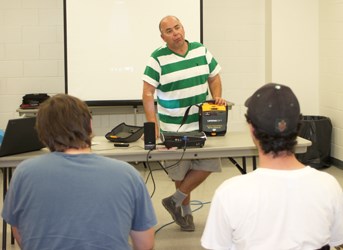Sudden cardiac arrest is the sudden and unexpected loss of heart function.
Without rapid and appropriate treatment, most cardiac arrests will result in death. Thousands of lives could be saved through public access to automated external defibrillators (AED).
Heart and Stroke Instructor Morley Forsgren has been training employees at locations where AEDs are situated on how to use the equipment in case of an emergency.
"What saves lives is early defibrillation. It's best to get a shock to a patient as soon as possible, within the one to four minute mark, and usually you're waiting for an ambulance anywhere up to 10 minutes," said Forsgren.
For every one minute delay in defibrillation, the survival rate of a cardiac arrest victim decreases by seven to 10 per cent. After more than 12 minutes, the survival rate is less than five per cent.
The first AED machine in Weyburn was installed between the Tom Zandee Sports Arena and Crescent Point Place in 2007. The AED was sponsored by Western Financial. The second was installed at the Weyburn Leisure Centre also in 2007 by Cenovus.
In 2009, that AED saved a life.
Since then, public AEDs have been installed in several Weyburn businesses. St. Vincent de Paul Roman Catholic Parish, McKenna Hall, the Weyburn Leisure Centre, the Royal Canadian Legion, Weyburn Red Wings, Crescent Point Place front lobby and between the sports arena, as well as Prairie Sky Co-op locations: the food store, Sud's City, Crossroads, Home Centre, Metro Centre, Milestone Co-op, Beaubier Co-op and Stoughton Co-op are all set up with AEDs.
AEDs are safe and easy to use by anyone, said Forsgren. The AEDs located in Weyburn are called CR Plus Defibrillators and are designed for simple use by the first person at the scene of a sudden cardiac arrest. The internal computer analyzes the heart rhythm and guides the user step-by-step with clear, calm voice prompts. It is also designed to automatically deliver a shock only if it determined one is needed.
The Canadian Heart and Stroke Association statistics show that any location that has 1,000 adults over the age of 35 present per day, during normal business hours, can expect at least one incident of sudden cardiac arrest every five years.
"Ideally, everywhere there is a fire extinguisher, there should be an AED," said Forsgren.




